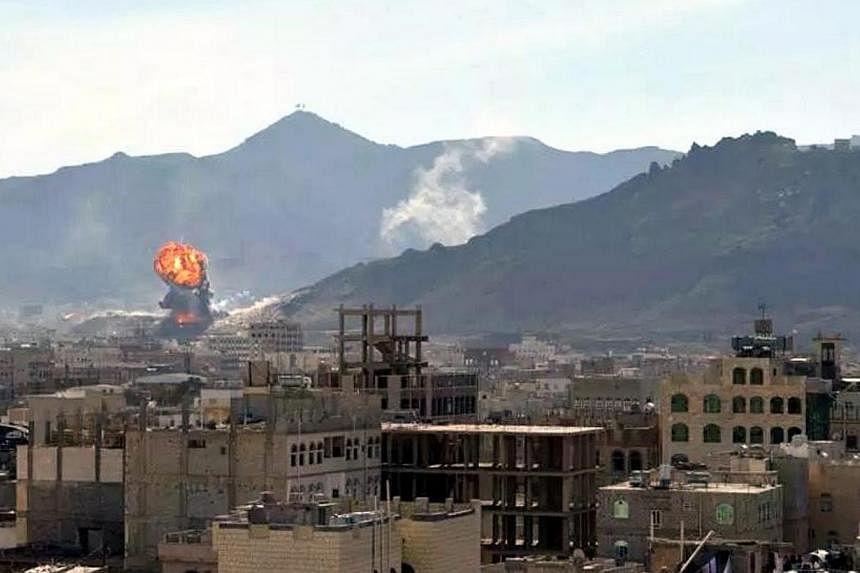SANAA (AFP) - Shiite militia in Yemen fought pitched battles with the army in the capital Sanaa for several hours on Monday in the biggest challenge yet to President Abdrabuh Mansur Hadi's rule.
At least nine people were killed and 67 wounded as the militia, known as Huthis, surrounded the residence of Yemeni Prime Minister Khalid Bahah and fired on a convoy carrying him, surrounded the presidential palace, seized an army base, took control of state media, and drew accusations they were mounting a coup.
The violence has raised fears that Hadi's US-backed government, which is a key ally in Washington's fight against Al-Qaeda, will collapse and Yemen will become a failed state similar to Somalia.
A security official said a halt in fighting had been agreed during a meeting of the defence and interior ministers with a Huthi representative.
Residents in areas around the presidential palace confirmed the fighting had subsided.
The clashes raised international concern, with the Arab League and the British and US embassies calling for an immediate end to the fighting.
A medical source said at least two people were killed and the health ministry said 67 were wounded.
The Huthis seized control of Sanaa in September and strategically important Yemen - which borders Saudi Arabia and is on key Gulf shipping routes - has since been wracked by unrest.
The Huthis appeared to be tightening their hold on the capital on Monday, saying they had seized an army base on a hill overlooking the presidential palace.
In a worrying sign for the government, Information Minister Nadia Sakkaf said the Huthis had also taken total control of state television and the official news agency.
"Yemeni satellite channel is not under state control, nor is state news agency Saba. The Huthis have completely controlled them and are refusing to publish any government statements," she wrote on Twitter.
Sakkaf said Huthi fighters had also fired on Prime Minister Bahah's convoy as he left the presidential residence but that he was unharmed.
Witnesses said the fighting erupted early Monday after the militia deployed reinforcements near the presidential palace.
The military presidential guard sent troops onto the streets surrounding the palace and outside Hadi's residence.
A security official said the army intervened when the Huthis began to set up a new checkpoint near the presidential palace.
But a prominent Huthi chief, Ali al-Imad, accused the presidential guard of provoking the clashes.
"Hadi's guard is trying to blow up the situation on the security front to create confusion on the political front," he said on his Facebook page.
Tensions have been running high in Sanaa since the Huthis abducted Hadi's chief of staff, Ahmed Awad bin Mubarak, in an apparent bid to extract changes to a draft constitution that he is overseeing.
Mubarak is in charge of a "national dialogue" set up after veteran strongman Ali Abdullah Saleh was forced from power in February 2012 following a year of bloody Arab Spring-inspired protests.
The Huthis said they had seized the top aide to prevent the violation of a UN-brokered agreement they reached with Hadi, which provided for the formation of a new government and the appointment of Huthi advisers to the president.
It stipulated that in return the Huthis would withdraw from key state institutions they had seized.
Mubarak's kidnapping came just before a meeting of the national dialogue secretariat to present a draft constitution dividing Yemen into a six-region federation, which the Huthis oppose.
The rebels, who hail from Yemen's remote north and fought a decade-long war against the central government, rejected the decentralisation plan last year, claiming it divides the country into rich and poor regions.
"The Huthis' decision to kidnap Mubarak was a serious escalation that now appears to be spiralling out of control," said April Longley Alley, an analyst with the International Crisis Group.
Since their takeover of the capital, the Huthis, also known as Ansarullah, have pressed their advance into areas south of Sanaa, where they have met deadly resistance from Sunnis including Al-Qaeda loyalists.
Yemen's branch of the terrorist network, Al-Qaeda in the Arabian Peninsula (AQAP), is considered its most dangerous and claimed responsibility for this month's attack in Paris on French satirical weekly Charlie Hebdo that left 12 dead.
Hadi's government has been a key ally of the United States, allowing Washington to carry out regular drone attacks on Al-Qaeda militants in its territory.

